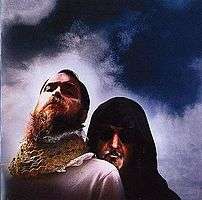Coil
Coil may refer to:
Science, technology and medicine
Music
Other uses
People with the surname
See also

Coil (band)
Coil was an English cross-genre, experimental music group formed in 1982 by John Balance—later credited as "Jhonn Balance"—and his life partner and collaborator Peter Christopherson, aka "Sleazy". The duo worked together on a series of releases before Balance chose the name Coil, which he claimed to be inspired by the omnipresence of the coil's shape in nature. Today, Coil remains one of the most influential and best-known industrial music groups.
The group's first official release as Coil was a 1984 12" album titled How to Destroy Angels released on the Belgian Les Disques du Crépuscule's sublabel LAYLAH Antirecords. Following the 12"s success, Some Bizarre Records produced two albums, Scatology, Horse Rotorvator and Coil departed SomeBizzare Label and Produced Love's Secret Domain, which met with little commercial success, but were praised as innovative due to their blend of industrial music and acid house.
In 1985, the group began working on a series of soundtracks, amongst them music for the first Hellraiser movie based on the novel The Hellbound Heart by their acquaintance at that time, Clive Barker. The group's first live performance in 16 years occurred in 1999, and began a series of mini-tours that would last until 2004. Following the death of John Balance on 13 November 2004, Christopherson announced via their official record label website Threshold House that Coil as an entity had ceased to exist.

Coil (album)
Coil is an album by Toad the Wet Sprocket released in 1997. It is their fifth studio album, and the final one before the band broke up in 1998. As with previous albums, Coil was released under the Columbia Records label and produced by Gavin MacKillop.
This album has been praised by some as the band's most mature album. It combines themes explored in all of their previous albums - including love, spirituality and the virtues of an uncomplicated life - and it continues the straightforward rock sound found in Dulcinea. One song from the album, "Come Down", hit the Billboard Modern Rock and Mainstream Rock Charts, and the single "Crazy Life" explores the perceived injustices experienced by Leonard Peltier. "Whatever I Fear" was also released as a single but failed to chart with poor backing from Columbia Records; thus in turn, the planned fourth single "Dam Would Break" was never released.
Track listing
Studio outtakes
Podcasts:

For Us
by: Pete YornAsk yourself
What do you think about us?
I was in the station
Working on something for us
You say your empty mind
Is easy when it's drugged
I watched you fall out of bed and scrape up your back
Well, maybe
This life is like the drug.
This life is like the drug.
Ask yourself
What do they say about us?
I was in the station
Cooking up something for us
You say your empty mind
Is easy when it's drugged
I watched you fall out of bed and scrape up your back
Well, maybe
This life is like your bed.
This life is like your bed.
I've seen you fall between
Everywhere we go
They want to love you, baby
More than you know
I've seen the storm inside you
All through the day I know it never leaves you
Not in that way
(Yeah)
I've seen your empty mind is easy when it's drugged
I've watched you fall out of bed and then scrape up your back
Well, maybe
This life is like your head.
This life is like your head.
This life is like your head...
Ask yourself
Ask yourself
